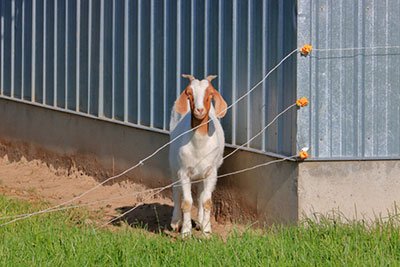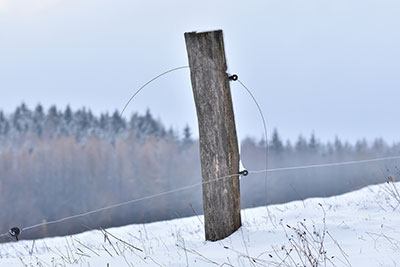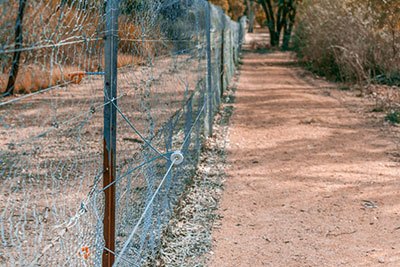Electric fences are a great tool for keeping animals or property safe, but when something goes wrong, it can be the cause of much stress and hassle. Unexpected electric fence problems can make farmers and ranchers feel helpless and even lead to potential livestock losses.
Luckily, there are some common electric fence issues that you should know about to help prevent disaster.
In this blog post, we discuss some of the most frequent problems with electric fencing and provide troubleshooting tips to help you get back up and running as quickly as possible.
Keep reading to learn more!
Take away key points:
- To locate faults in your fence, it’s recommended to use a fault-finder or a voltmeter tester, as it is the fastest and most precise method.
- Poor grounding can lead to weak shocks.
- Broken wires or insulators can cause the current to escape and reduce its effectiveness.
- Moisture can reduce effectiveness and create hazards
- Low-quality components compromise the fence effectiveness.
Table of Contents
- Voltage drops: why they happen and how to fix them
- Grounding out: Tips for identifying and correcting the problem
- Weak current: troubleshooting solutions for lack of power
- Radio interference: identifying and fixing common causes
- Power loss: dealing with unexpected outages
- Weather-related issues: keeping your electric fence operational in all conditions
- Installation errors and faulty materials: Common mistakes to avoid when setting up your electric fence
- FAQs
- What is one of the biggest problems with an electric fence?
- Why is my electric fence not pulsing?
- What happens if an electric fence isn’t grounded?
- Why is my electric fence shocking through the ground?
- Can dry ground affect the electric fence?
- Does the animal have to be touching the ground for electric fence to work?
- Is it OK for grass to touch an electric fence?
- Final words
Voltage drops: why they happen and how to fix them
The components of an electric fence include a fence charger, fence wire, ground wire, ground system, and lead-out wire.
Voltage drops are a common issue in electric fencing systems. They occur when there is a decrease in the electric current running through the fence, which can lead to a weaker or ineffective fence line.
Voltage drops can happen for several reasons, including damage to the fence wire or broken insulators, poor connections between wires and fence post, excessive soil moisture or weeds and vegetation interfering with the fence line.
When voltage drops occur, it can create vulnerabilities in the fence, such as areas where livestock can escape. As a result, it’s essential to identify and address any voltage drops as soon as they’re detected to maintain the effectiveness of the electric fence.

How to fix voltage drops?
To fix voltage drops in your electric fence, you should take the following steps:
– Inspect the fence wire and insulators to ensure they are all intact and not damaged.
– Check all connections between wires and fence post. Make sure that they are all tight and no corrosion is present.
– Remove any weeds or vegetation that may be interfering with the fence line.
– Move the power source closer to the fence charger, if possible.
– Consider upgrading your defective charger or adding a second charger for larger fence systems.
Grounding out: Tips for identifying and correcting the problem
Poor grounding out in electric fences refers to a phenomenon when the electric current is lost into the ground instead of flowing through the fence wire. This is one of the common electric fence earthing problems many homeowners deal with.
Most common electric fence fault grounding issues can happen when an electric fence is not properly grounded, or the grounding system is faulty, and the electricity instead discharges into the soil.
Grounding out can weaken the fence, rendering it ineffective, and also be dangerous for livestock and other animals that come into contact with it.
Identifying grounding out issues
There are a few signs that can indicate a poor earth grounding out issue with your electric fence:
– Low voltage or inconsistent shocks
– Disconnected ground rod or ground wire
– Damage or wear to the fence line or insulators
– Animal escapes
– Vegetation growth around the fence line
– Wet vegetation or damp soil around the fence posts
Correcting the most common electric fence grounding issues
To fix a grounding out issue in electric fencing, follow these steps:
– Inspect your fence for broken ground wire, worn insulation, or damaged insulators. Fix any damage you find.
– Check the grounding system for issues, such as broken ground rods or poor connections between the grounding system and fence charger.
– Install lightning protectors to help prevent power surges from damaging your fence.
– Add more ground rods for the ground system, and enable adequate earth grounding.
Weak current: troubleshooting solutions for lack of power
A weak current in an electric fence system is a decrease in the electrical power moving through the fence wire, which can result in ineffective operation of the fence.
Signs of weak current can include the bottom wire touching tall grass around the fence line, faulty insulator or damaged wires, a low-capacity charger, a malfunctioning grounding system, or poorly connected/broken fence wires.
A weak current can be dangerous as it can provide an opportunity for animals or other entities to escape or intrude.
Identifying weak current issues

To troubleshoot a weak current issue, you need to know what to look for. The following signs may indicate that your electric fence is not producing enough power. Make sure you use digital voltmeter to measure the fence voltage:
– Grass growing too tall around the fence line.
– Faulty ground rods or a broken wire in the ground system
– Worn-out insulators or damaged wires that break the electrical circuit.
– Defective or low-capacity charger.
– Malfunctioning grounding system.
– Poor quality insulators
– Poorly connected or broken fence wires.
– Ineffective grounding system.
Solutions for weak current
Here are some steps you can take to troubleshoot electric fence problems:
– Inspect the fence lines, power output, posts, and insulators for damage or wear and fix them. Add more ground rods if necessary.
– Use a fence tester to measure the voltage of your fence system and identify the source of the issue.
– Install or upgrade your charger to a higher-capacity model and use a high-tensile wire for optimal service.
– Check the ground system and ground rods for faults and make sure that it is correctly installed.
– Increase the fence wire density by adding additional wires.
– Remove any vegetation growing along the fence line.
– Make sure to maintain regular upkeep and maintenance of your electric fence system.
Radio interference: identifying and fixing common causes
Radio interference in an electric fence is an issue that can cause static, noise or radio frequencies that can interrupt the proper functioning of the fence. It can cause erratic voltage readings on fence testers and weaken the overall strength of the electric fence.
Identifying radio interference
If you hear static or noise emanating from your electric fence, the chances are high that your fence is suffering from radio interference.
Interference can also cause erratic voltage readings on your fence tester, which indicates a problem.
Common causes of radio interference
– Electrical equipment near the fence line that emits radio frequencies.
– Local radio and telecommunication towers near the fence.
– Improper grounding of the electric fence.
– Low-quality, damaged, or worn-out insulators or wires.
– Ineffective electric fence controllers.
Fixing radio interference
– Check for electrical equipment near the fence line that emits radio frequencies. Relocating these pieces of equipment can help resolve the issue.
– Install line filters to diminish the effects of radio signals on your electric fence.
– If you have a weak grounding system, reposition the fence grounding system to minimize interference.
– Inspect the insulators and wires of the electric fence line and ensure it is correctly installed and in good condition.
– If all other methods fail, consider replacing low-quality or ineffective fence controllers with a higher-quality model.
Power loss: dealing with unexpected outages
Common problems when testing electric fences are often are due to power loss.
Power loss in an electric fence system refers to the situation when the fence is no longer receiving electricity from the power box and the fence line is no longer active.
Power loss can occur for several reasons, such as tripped breakers, blown fuses, improper grounding, defective chargers, weak batteries if using a battery-powered fence charger of when the solar panels and solar fence chargers are not facing the sun directly.
Power loss can make the electric fence vulnerable to animal escapes or unwanted intrusions; hence, identifying any power loss issues immediately is crucial to maintaining the effectiveness of the fence line.
Solutions for power loss
– Check the power source and voltage output and make sure that it is turned on and properly plugged in and measure it out with an electric charger. Use a voltage tester and check the voltmeter reading to see if the reading is higher on one wire. This can often be a main cause power-loss.
– Use a fence tester to check the voltage level of your fence charger and make sure it is functioning correctly.
– If you use AC chargers, check the circuit breaker of the power source and make sure the breaker is not tripped or blown.

Weather conditions can impact the effectiveness of an electric fence system. High winds, heavy rain or snow, and extreme temperatures all have the potential to damage the fence or disrupt its operation.
Here are some tips to help you keep your electric fence operational in all weather conditions:
High wind considerations
High winds can cause damage to your electric fence system. To prevent damage, follow these guidelines:
– Ensure fence posts are properly installed and secure.
– Clear surrounding trees and vegetation that could break and fall onto the fence line.
– Secure loose wires and insulators.
– To account for the wind-induced movement, adjust the voltage of the electric fence.
Heavy rain and snow considerations
Heavy rain and snow can also disrupt the operation of the electric fence. Here are some considerations to keep in mind during these conditions:
– Install drip loops in the electric fence wire to prevent water from running down the wire and shorting out the fence.
– Keep the electric fence wire taut to prevent sagging under the weight of snow.
– Use ceramic or other high-quality insulators that resist degradation to prevent short circuits by water in wet conditions.
Extreme temperature considerations
Extreme temperatures, hot or cold, can also impact the operation of your electric fence. Here’s how to deal with these conditions:
– Adjust the voltage of the electric fence to compensate for temperature changes.
– Avoid running fence wires too close to heat sources in hot temperatures.
– Install insulators to prevent cracking of the wires in cold temperatures. Poor-quality insulators crack under harsh weather.
Installation errors and faulty materials: Common mistakes to avoid when setting up your electric fence
Proper installation is critical to ensuring the effectiveness and longevity of your electric fence system.
Mistakes made during installation can cause the system to malfunction, fail or pose a danger to people and animals.
Here are some common installation errors and faulty materials to avoid:
Inadequate grounding
If your electric fence system is not correctly grounded, it will not work effectively. The ground rods of the ground system or plates must be installed at proper intervals, and the ground system must be properly bonded to the fence controller or charger.
If the metal-to-earth contact is poor, it will lead to an inefficient circuit and insufficient current flow because the electrical circuit runs along the ground towards the earth rod.
Poor wire connections
Wire connections are crucial to ensuring that the electrical current flows correctly through the fence system. Faulty, loose, or poorly insulated connections in the ground system can cause the system to short out and become ineffective.
Using low-quality components
Using low-quality insulators, wires, chargers, or grounding components can cause the fence to function poorly, rendering it ineffective or dangerous.
Always purchase high-quality or branded components from reputable suppliers to ensure the longevity and effectiveness of your electric fence system.
Incorrect fence placement
Fence placement should be well-thought-out to avoid issues such as uneven terrain or curvature of the land, which can cause problems in installation. Failing to consider fence placement can cause issues with tension, sag and the proper grounding of your electric fence.
Wire stretched too tight

The wires should be allowed to float past each fencepost in order to maintain elasticity, similar to a rubber band effect. Wires tied tight can often be an indicator of poor installation. Although tape is sometimes used to restrict wind flap by locking into insulators on each post, this can limit the wire’s elasticity and cause a stiff wire.
Too many wire tie offs
“Too many wire tie-offs” is a common problem in electric fences that can affect their effectiveness.
Wire tie-offs are the points where the fence wire is tied off to the posts or insulators. Too many wire tie-offs and tightly strained wires can cause the electric current to be diverted and dispersed, reducing the voltage and the overall effectiveness of the fence.
Not following electrical codes
Always make sure you are following local electrical codes, which are designed to ensure that the fence system is installed safely and correctly. Failure to follow electrical codes can result in hazards such as electrocution or fires.
By avoiding these common installation errors, you can ensure that your electric fence system is set up to operate efficiently and safely.
Additionally, regular maintenance and inspection of your electric fence system can detect any issues caused by faulty installation practices, preventing problems and ensuring the longevity of your system.
FAQs
What is one of the biggest problems with an electric fence?
One of the biggest problems with an electric fence is that it can malfunction if not installed and maintained appropriately.
Why is my electric fence not pulsing?
Your electric fence may not be pulsing due to reasons such as a faulty power supply, battery, short-circuited wires, insufficient grounding, faulty fence controller or charger, or poor contact. Turn off the power supply before attempting any repairs, and if unsure, consult a professional.
What happens if an electric fence isn’t grounded?
If an electric fence isn’t grounded, the electric current cannot complete the circuit and flow through the fence. The lack of grounding can lead to weak electric shocks, which can be ineffective in deterring animals or intruders.
Without proper grounding, the fence can also become a hazard to people and animals, as any contact with the fence can result in a severe electric shock.
Why is my electric fence shocking through the ground?
Suppose you experience an electric shock through the ground near your electric fence. In that case, it is likely due to poor or inadequate grounding, broken wires or insulators, moisture, low-quality components, or improper electric fence controller or charger settings.
Check the grounding system, inspect the fence line, and ensure that all components are of high quality or consult a professional to avoid hazards.
Can dry ground affect the electric fence?
Yes, dry ground can affect the effectiveness of an electric fence. Dry ground has a higher resistance to electric current flow, which can lead to a reduced shock from the electric fence. This can pose a problem in areas with extended dry seasons, where the ground may become extremely dry.
Does the animal have to be touching the ground for electric fence to work?
No, the animal does not have to be touching the ground for the electric fence to work. The electric fence works by transmitting an electrical current through the wires or conductive material of the fence to create a barrier.
Is it OK for grass to touch an electric fence?
It is okay for grass to touch an electric fence, but it is ideal to keep it trimmed to avoid creating a path to the ground that may reduce the voltage of the electric fence.
Final words
In conclusion, electric fences can be an effective and efficient way to contain livestock, protect property, and enhance security. However, like any electrical system, electric fences can have issues that may reduce their effectiveness or even become a hazard to people and animals.
Regular maintenance and inspection of electric fence systems are essential to ensuring that they are functioning correctly and operating safely.
